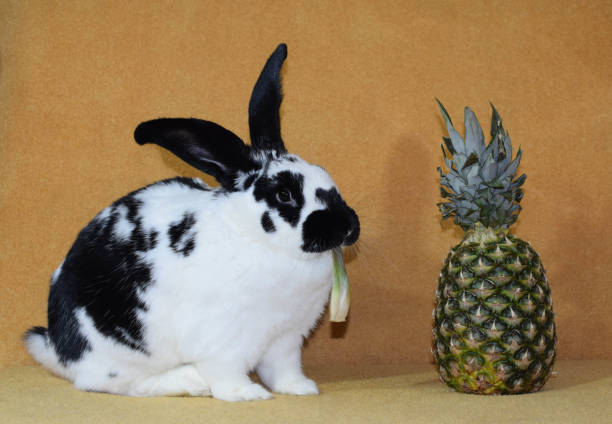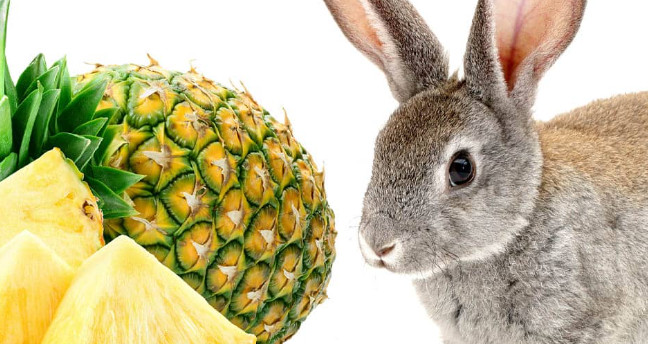When it comes to our furry friends, especially the adorably nibbly rabbits, ensuring their diet is both nutritious and safe is paramount for any pet owner. Pineapple, a tropical fruit cherished by many for its juicy sweetness and health benefits, often finds its way into our kitchens. But does it belong in our rabbits’ feeding bowls? In this comprehensive exploration titled “Can Rabbits Eat Pineapple?”, we delve into the heart of this question with expertise and care.
Armed with insights from veterinary nutrition experts, this article not only unveils if pineapple is a safe treat for rabbits but also explores the nutritional benefits and potential concerns associated with feeding this exotic fruit to your pet. Our aim is to offer you a blend of scientific research and practical advice, ensuring you’re well-equipped to make informed dietary choices for your fluffy companion.
Moreover, we understand the curiosity and concerns that come with pet ownership. Therefore, this piece is designed not just to answer a simple yes or no question but to enrich your understanding of rabbit nutrition as a whole. By the end of this article, you’ll not only know if rabbits can enjoy pineapple but also how to incorporate such treats into their diet responsibly.
Join us as we peel back the layers of this intriguing topic, offering you a slice of knowledge on rabbit care that promises to be as refreshing as the fruit in question. Whether you’re a seasoned rabbit owner or considering adding one to your family, this article is a must-read, filled with valuable insights that will help you ensure the health and happiness of your furry friend.
An Overview of Rabbits’ Dietary Needs
Rabbits are herbivores, meaning they eat plants. Their digestive systems and teeth are adapted for efficiently chewing and processing high-fiber vegetation. A rabbit’s healthy diet should consist mostly of grass hay, leafy greens, veggies, and limited pelleted feed. This provides the fiber, nutrients, and calcium-to-phosphorus ratio required for good gut function and dental health.
Treats like fruit are enjoyed in moderation, making up only a small portion of a rabbit’s total food intake. Pineapple and other sugary fruits carry risks of overfeeding, so experts suggest limiting them to a tablespoon or two, two or three times per week at most.
What’s in Pineapple Nutrition-wise?
Pineapple is low in fat and calories but packed with vitamins, minerals, and fiber. One cup contains:
- Vitamin C – 131% RDI
- Manganese – 76% RDI
- Vitamin B6 – 9% RDI
- Copper – 9% RDI
- Thiamin – 9% RDI
- Folate – 7% RDI
- Potassium – 5% RDI
- Fiber – 2.3g
However, pineapple also contains natural sugar. One cup has 16 grams, similar to other fruits. Too much sugar can cause gastrointestinal upset and weight gain in rabbits.
Can Rabbits Eat Pineapple?
Rabbits can indeed eat pineapple, but it should be given in moderation. Pineapple is a healthy treat for rabbits when offered fresh and in small portions. It is essential to avoid canned or syrupy pineapples due to their high sugar content. When feeding rabbits pineapple, it’s crucial to ensure it’s pesticide-free and cut into small pieces to prevent overindulgence. Dried pineapple can also be given as a source of fiber, aiding in maintaining a healthy digestive system for rabbits. However, canned pineapple is not recommended for rabbits as the extra sugar can upset their digestive system.
Fresh vs. Processed: Which is Better?
Experts recommend feeding rabbits only fresh, raw pineapple, not canned or juice. Processing destroys nutrients and adds preservatives. The fibrous texture of raw pineapple is also healthier for rabbits’ teeth and gut.
The flesh and juice of fresh pineapple provide hydration and small amounts of vitamins rabbits can utilize.
Impacts of Pineapple on Rabbit Health
The nutrients in pineapple may benefit rabbits in the following ways:
- Fiber – Promotes healthy digestion and gut motility
- Vitamin C – Boosts immunity and heals wounds
- Bromelain enzyme – Reduces inflammation and helps respiratory issues
- Anti-oxidants – May protect against cellular damage
However, risks of pineapple include:
- High sugar – Can cause diarrhea, obesity, and liver issues
- Acidic – Can impact dental health if overfed
- Allergies – Pineapple is a common allergen for rabbits
Moderation is key when feeding pineapple to avoid adverse effects.
Proper Portion Sizes by Age
The appropriate serving size of pineapple depends on a rabbit’s age and weight:
- Baby rabbits under 12 weeks – None
- Growing young rabbits – 1 tsp, once or twice weekly
- Small adult rabbits – 1 tbsp, one to two times weekly
- Large adult rabbits – 2 tbsp, two to three times weekly
Pineapple should be a treat, not a dietary staple. For young or smaller rabbits, start with a tiny amount and gradually increase to the recommended serving size as long as it is well-tolerated.
Preparing Pineapple Safely for Your Bunny
To make pineapple safe and digestible for rabbits, proper preparation is important:
- Wash thoroughly under cool running water to remove dirt and chemicals. Pat dry.
- Use a sharp knife to carefully slice off the skin and cut the fruit into chunks.
- Core the pineapple to remove woody, indigestible parts.
- Cut chunks into rabbit-friendly bite-sized pieces.
- Refrigerate any unused portion for later to avoid spoilage.
The flesh is the only edible part of a pineapple for rabbits. Remove all rind, skin, leaves, and the prickly outside layer. The core should also be discarded since it’s too tough to chew and digest.
Health Considerations When Feeding Pineapple

It’s essential to introduce new foods slowly and watch for any adverse reactions. Monitor your rabbit for the first several hours after giving pineapple. Signs of an allergic reaction or intestinal upset include:
- Diarrhea
- Reduced appetite
- Lethargy
- Swollen mouth or tongue
Discontinue feeding pineapple if any distress signals are observed.
The natural sugars in pineapple pose a risk for digestive issues if over-consumed. Obesity is also a concern if too many high-calorie fruits or treats are fed routinely.
Always choose organic pineapple when possible to minimize pesticide exposure. Even store-bought pineapple should be washed thoroughly before preparing.
Alternative Fruits Rabbits Can Eat
For diversity, rotate pineapple with other rabbit-safe fruits like:
- Banana
- Raspberries
- Blackberries
- Blueberries
- Strawberries
- Melon
- Mango
- Papaya
- Apple (no seeds)
Aim for variety over the same fruit daily. Recommended serving sizes and frequencies apply to all sugary treats.
Fruits are also generally better tolerated in warmer months when rabbits are more active. Increase dietary fiber from hay when feeding fruits occasionally.
Pineapple for Behavioral Enrichment
Along with nutrition, fruits like pineapple provide mental stimulation and foraging enrichment for rabbits. Turn feeding time into an engaging activity by:
- Hand feeding small pieces as a bonding experience
- Hiding pieces around their enclosure for them to find
- Putting pineapple pieces in a food-dispensing toy
Rotate different healthy treats to prevent boredom. This provides environmental enrichment by allowing rabbits to exhibit their natural foraging behaviors.
Choosing and Serving Pineapple Ethically
When buying and serving pineapple, consider sustainability and waste reduction:
- Select pineapple certified as fair trade and organically grown
- Compost leftover peel, rind, and core rather than trashing them
- Use all edible pineapple flesh promptly after preparing rather than wasting any
- Adjust portion sizes to your rabbit’s appetite to minimize excess
With proper precautions, a few bites of fresh pineapple can be a fun, healthy supplement to a balanced rabbit diet. Speak to your veterinarian about any concerns over feeding pineapple or other fruits to your bunny.
Expert Opinions on Feeding Rabbits Pineapple
Veterinarians stress considering the individual rabbit’s health history and possible fruit allergies or sensitivities. They recommend:
- Introducing fruits slowly and watching for signs of digestive upset
- Limiting portion sizes to a tablespoon or less per 2-6 lbs body weight
- Ensuring the bulk of the diet is grass hay and leafy greens
Rabbit Owners Share Their Pineapple Experiences
Many rabbit owners report their pets enjoy pineapple as an occasional treat. With proper preparation and size limits, they’ve observed no adverse effects. Some have noted soft stools if too much is fed at once. Starting with minimal amounts and finding each rabbit’s tolerance helps prevent issues. Owners suggest monitoring litter box habits closely when first introducing new fruits.
The Takeaway on Pineapple for Rabbits
While pineapple tastes sweet and appetizing to humans, it should only be an occasional small treat for rabbits. When fed in moderation, paired with a primarily hay and veggie-based diet, and prepared properly, the nutrients in pineapple can provide some benefits. But improper amounts pose real health risks for rabbits. Know proper serving sizes for your bunny’s age and weight. And as with any new food, start slowly and watch closely for any reactions. With some smart precautions, you can likely safely share a taste of this tropical fruit with your rabbit.
